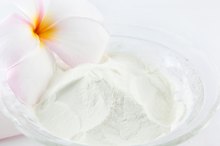Low White Blood Cells & a Vitamin D Deficiency
It has long been known that vitamin D plays a vital part in maintaining strong bones and teeth. There is new evidence that vitamin D has a crucial role in regulating your immune functions, according to a 2009 paper in “Expert Reviews in Clinical Immunology.” The review adds that vitamin D deficiency may be linked to many diseases. Vitamin D is also needed to boost white blood cell production.
Your Immune System
Your immune system protects you from a plethora of intruding viruses, bacteria and parasites and a host of other disease-causing organisms. The immune system has two lines of defense, or attack. The first is non-specific and includes your skin, tears, the hair in your nostrils and the mucus in your respiratory system, to name a few. The specific defense system are your white blood cells that come in two basic types – lymphocytes, from your lymph system, and leukocytes, or white blood cells.
- Your immune system protects you from a plethora of intruding viruses, bacteria and parasites and a host of other disease-causing organisms.
- The specific defense system are your white blood cells that come in two basic types – lymphocytes, from your lymph system, and leukocytes, or white blood cells.
White Blood Cells and Vitamin D
Vitamin B-12 in Mushrooms
Learn More
White blood cells carry a vitamin D receptor that allows the immune system to guard against infection. There are several different types of WBCs, including dendritic cells and macrophages, each requiring vitamin D to perform their jobs. The Linus Pauling Institute states that in specific cases, macrophages may produce an enzyme that is needed to make the active form of vitamin D to enable the macrophages to function properly.
Cathelicidin
In the event of vitamin D deficiency, the antimicrobial peptide cathelicidin is low. Cathelicidin is produced by WBCs to attack microbial invaders. Vitamin D promotes increased production of this broad spectrum peptide and increases your immunity to infection. Without vitamin D, as in the case of a deficiency, you are more open to disease and illnesses. A 2008 study in the "Journal of Allergy and Clinical Immunology" supplemented 14 subjects with 4,000 international units of vitamin D daily over three weeks and found that the white blood cells produced more cathelicidin.
- In the event of vitamin D deficiency, the antimicrobial peptide cathelicidin is low.
- A 2008 study in the "Journal of Allergy and Clinical Immunology" supplemented 14 subjects with 4,000 international units of vitamin D daily over three weeks and found that the white blood cells produced more cathelicidin.
Link Between Vitamin D and White Blood Cells
Allergy to Vitamin B-12
Learn More
New physiological functions of vitamin D are emerging, claims the article in “Expert Reviews in Clinical Immunology.” It is becoming apparent that vitamin D insufficiency and deficiency are linked to poor immune functioning, which may translate to low white blood cell counts. The review adds that vitamin D deficiency is associated with increased infections and susceptibility to cancer, but more research is necessary. Do not replace vitamin D supplementation for any traditional medication or treatment without consulting your doctor.
Related Articles
References
- “Expert Reviews in Clinical Immunology"; Vitamin D, the Immune System and Asthma; Nancy E. Lange, et al.; November 2009
- Linus Pauling Institute: Vitamin D
- University of Cincinnati: Immune System
- "Journal of Allergy and Clinical Immunology"; Administration of Oral Vitamin D Induces Cathelicidin Production in Atopic Individuals; Tissa R. Hata, et al.; October 2008
- Institute of Medicine (US) Committee to Review Dietary Reference Intakes for Vitamin D and Calcium; Ross AC, Taylor CL, Yaktine AL, et al., editors. Dietary Reference Intakes for Calcium and Vitamin D. Washington (DC): National Academies Press (US); 2011. 3, Overview of Vitamin D.
- Roy S, Sherman A, Monari-Sparks MJ, Schweiker O, Hunter K. Correction of low vitamin D improves fatigue: Effect of correction of low Vitamin D in fatigue study (EViDiF study). N Am J Med Sci. 2014 Aug;6(8):396-402. doi: 10.4103/1947-2714.139291
- Wong SK, Chin KY, Ima-Nirwana S. Vitamin D and Depression: The evidence from an indirect clue to treatment strategy. Curr Drug Targets. 2018;19(8):888-97. doi: 10.2174/1389450118666170913161030
- Nair R, Maseeh A. Vitamin D: The "sunshine" vitamin. J Pharmacol Pharmacother. 2012;3(2):118-26. doi:10.4103/0976-500X.95506
- Meena N, Singh Chawla SP, Garg R, Batta A, Kaur S. Assessment of vitamin D in rheumatoid arthritis and its correlation with disease activity. J Nat Sci Biol Med. 2018;9(1):54-58. doi:10.4103/jnsbm.JNSBM_128_17
- Fares A. Winter cardiovascular diseases phenomenon. N Am J Med Sci. 2013;5(4):266-79. doi:10.4103/1947-2714.110430
- Porojnicu AC, Dahlback A, Moan J. Sun exposure and cancer survival in Norway: changes in the risk of death with season of diagnosis and latitude. Adv Exp Med Biol. 2008;624:43-54. doi: 10.1007/978-0-387-77574-6_4
- Holick MF et al. Evaluation, treatment, and prevention of vitamin D deficiency: an Endocrine Society clinical practice guideline. J Clin Endocrinol Metab. 2011 Jul;96(7):1911-30. doi: 10.1210/jc.2011-0385
- Ross AC et al. The 2011 report on dietary reference intakes for calcium and vitamin D from the Institute of Medicine: what clinicians need to know. J Clin Endocrinol Metab. 2011 Jan;96(1):53-8.
- Pilz et al. Vitamin D testing and treatment: a narrative review of current evidence. Endocr Connect. 2019 Feb 1;8(2):R27-R43. doi: 10.1530/EC-18-0432
- National Institutes of Health Offices of Dietary Supplements. Vitamin D fact sheet. Updated August 7, 2019.
Writer Bio
Carrie Cross has been writing for profit and pleasure for more than 35 years. Her background includes business, real estate, entrepreneurship, management, health and nutrition. A registered nurse, she has published various pieces, including web content, numerous newspaper and magazine articles and columns and six books.









